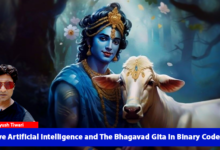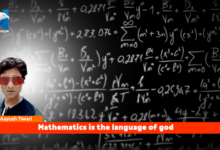
“The more I know the more I know about my ignorance” – this idea that the more we learn, the more we realize how much we need to learn.
“ना जनामी योगम जपम नैव पूजाम
नातोहम सदा सर्वदा शम्भू तुभीयम “
तुलसीदास
कवित विवेक एक नहीं मोरे
सत्य कहूं लिखूं कागज़ कोरे l
So As a self-proclaimed spiritual terrorist, I am not afraid to challenge the status quo and question traditional beliefs. This term i am a spiritual terrorist is not coined by me but is oftenly used for UG Krishnamurty and Rajneesh Osho – who anchored a commune in Rajnish Puram USA, OREGON in the heart of a capitalist superpower – The USA.
I am constantly seeking knowledge and understanding, but the more I learn, the more I realize how little I truly know.In our modern world, there is a constant pressure to have all the answers and be an expert in everything. But true spirituality is not about having all the answers, it is about embracing the unknown and being open to continual growth and learning.
As I dive deeper into spiritual practices and teachings, I am humbled by the vastness and complexity of the universe. The more I learn, the more I realize that my previous understanding was just scratching the surface.
This realization can be daunting and even unsettling. It can be tempting to cling to our limited beliefs and resist the discomfort of acknowledging our ignorance. But as a spiritual terrorist, I embrace this discomfort and use it to propel me further on my journey.
I am not afraid to admit that I don’t have all the answers. In fact, I revel in the mystery and embrace the uncertainty. It is through this acceptance of my own ignorance that I am able to truly expand my consciousness and deepen my spirituality.
I challenge others to do the same. Let go of the need to have all the answers and instead, embrace the unknown. Allow yourself to be a perpetual student, always open to learning and growing. This is the path to true spiritual enlightenment.
In a world where knowledge and information are constantly at our fingertips, it is easy to fall into the trap of thinking we have all the answers. But as a spiritual terrorist, I reject this notion and instead embrace the never-ending journey of discovery and self-awareness.
So let us all embrace our ignorance and use it as a catalyst for spiritual growth and transformation. As we continue to learn and expand our understanding, we will realize that true spirituality is not about having all the answers, but rather about embracing the unknown and being open to continual growth and evolution. This is the true essence of being a spiritual terrorist.
In “I am a spiritual terrorist,” part 1 we explored the provocative notion that true spirituality transcends the sensory experiences often associated with it. We questioned the validity of labeling something as spiritual based solely on its sensory attributes, arguing that this merely serves to create a divide between what is considered spiritual and what is not.
Continuing our exploration, we now delve into the intriguing concept of deep dreamless sleep and its connection to spirituality. Deep sleep, scientifically known as the delta state, offers an intriguing perspective on the spiritual realm. During this state, our bodies continue their natural functions like breathing and digestion, yet our conscious mind and its incessant chatter vanish. It is a profound stillness, where thoughts, stories, and personal narratives fade away, leaving us in a state of pure being.
Furthermore, if we observe closely, we can find glimpses of this state outside of sleep. Classical singers entering a trance-like state, marathon runners experiencing a thoughtless rhythm, and dancers dissolving into their performance all exhibit characteristics reminiscent of the deep sleep state. These moments of transcendence and dissociation from the mind can be seen as spiritual experiences. In Vedanta, this state is referred to as sushupti, while yogis who have truly tapped into it call it the anandmayakosha, translating to the sheath of bliss.
One quote from the renowned Sufi scholar Abdul Rahim Khankhana beautifully encapsulates the essence of real spirituality: “The one who knows won’t say, the one who says won’t know.”
रहिमन बाते अज्ञेय की
कहत सुनत की नाहीं
जो जानत सी कहत नहीं
जो कहत सो जानत नाहीं
This highlights the limitation of expressing spirituality through words and symbols. Those who have truly realized something beyond the mind find it challenging to put their experience into words, as any linguistic expression inevitably becomes entangled in the mind’s domain of stories and memories.
However, not everyone embraces this perspective. Throughout history, numerous gurus and mystics have attempted to convey spiritual truths using various symbolic representations such as Vedanta, martial arts, or the Tao. Regrettably, this trend has led to the commercialization and manipulation of spiritual teachings, resulting in a zillion-dollar industry that often veers away from their true essence. Words and thoughts are given undue importance, without questioning their nature and origin.
It is essential to recognize that the mind’s constant chattering encumbers us, preventing us from accessing the profound silence that underpins all spiritual endeavors. As one of the provocative figures of our time, UG Krishnamurthy, put it, “I am like a dog barking; you are the one trying to convert it into a language.” Here, UG Krishnamurthy challenges the very essence of language and its limitations in conveying the depth of spiritual experiences.
धीरे धीरे रे मना धीरे से सब होये,
माली सीचे सौ घड़ा, ऋतू आये फल होये
In the realm of contemporary spirituality, where even enlightenment is promised for a few dollars, we must be vigilant against becoming mere consumers in the money market of spirituality. Let us not forget the plight of great thinkers like Socrates, Jesus, Osho, and Mansoor, who faced severe consequences for challenging the belief systems of the masses. It is in this context that the label “spiritual terrorist” arises – not as a call for violence, but as a refusal to conform to the comfort zones of the crowd and a rejection of the prevalent norms and commercialization of spirituality.
In conclusion, spirituality is not easily confined or defined. It goes beyond sensory experience and language, extending into a realm of deep inner silence and transcendence. True spirituality cannot be commodified or packaged for mass consumption; it unfolds in our individual journeys, and for each of us, it may take different forms. Let us strive to embrace the ineffable nature of spirituality while remaining vigilant against any attempt to commercialize or manipulate its teachings.





